| |
"There can’t be many 1970s movies which had Elizabeth Taylor in the cast yet which did not bill her in the credits. But, then, Winter Kills has a production history so quirky and so labyrinthine that it is worthy of a movie about its own production. I saw it once about 25 years ago and – believe me – see it once and you don’t forget it." |
| |
So It Goes: John Fleming’s Blog on Winter Kills* |
Well, that's certainly true. After having seen it, the experience is not dissimilar to watching a very enthusiastic jigsaw enthusiast take several pieces from twenty-four widely diverse puzzles and go about trying to make them not only fit together but also have the whole picture make some sort of sense once 'completed'. As a reviewer (or more accurately at Cineoutsider, a supporter of cinema), you may know something is up with the production when during its three-year delivery period one of its two producers is executed by the Mafia and the other goes to prison for 40 years for drugs offences. It gets a lot crazier than that. I have never known a Hollywood film quite like Winter Kills and while that may be a positive thing (any outlier is welcome in these days of corporate conformity, cookie-cutter sequels and formula following) the movie itself defies pigeonholing. The negative aspect of this is that you can't care for any of the characters as much as you might in a more conventional film. This isn't to say the effort should not be loudly applauded. It invites incredulous scrutiny and while there are plenty of aspects of the film to enjoy, it's almost impossible for me to say I unreservedly loved it, absurd fun it may be for the most part. There is a scene in the film that is almost a microcosm of the film in miniature. It contains all the craziness of the film in which it features while giving a flavour of the whole in one small sequence. The hero, whose rich family seems to replicate its own original palatial apartment in hotels (and one hospital) all over the world, is trying to loosen a tight knot of a conspiracy theory while being frustrated at not being able to contact the love of his life. Answering machines were futuristic devices the size of two shoe boxes in 1976 (when shooting started). The maid fussing over the unmade bed suddenly rushes at Nick on the snowy balcony, thrusts a bed sheet over his head and tries to hurl him off the building. He manages to rip open a hole in the bed sheet and in forcing the maid off him, he tears her apron down revealing her breasts and she runs off down the corridor semi-naked. That's Winter Kills in a nutshell. It's as sane as a straitjacketed masochist in a padded cell.
There are fourteen vertically-scrolled screen's worth (and I have a big screen) of trivia in Winter Kills' IMdb entry. Fourteen. Yes, there's some repetition and some really trivial trivia but how could a film with this level of reputation get past my voracious 'must-see-all-the-good-stuff made in the 70s', appetite? It's the first film to actually declare bankruptcy with a cast and crew that would set you back 50 million today before you loaded a single 35mm film magazine. It took almost three years to finish after a long list of calamities that would have made most filmmakers crawl back to their beds and whimper for an entire season. It should have been at the very least one of the most infamous Hollywood movies of all time. Perhaps in my arrogance, I ignored it (it bombed rather badly on theatrical release and being swiftly withdrawn by its distributor didn't help its commercial prospects) or I simply never made contact with it. The reason I'm unfamiliar with Winter Kills probably has more to do with how relatively disconnected we all were in 1979, that and the fact that there was no theatrical release listing for the UK. Ah. OK.
Note: the Sight and Sound Review excerpted in the booklet indicates that Winter Kills did open in the UK, in 1985. Right then. I still missed it.
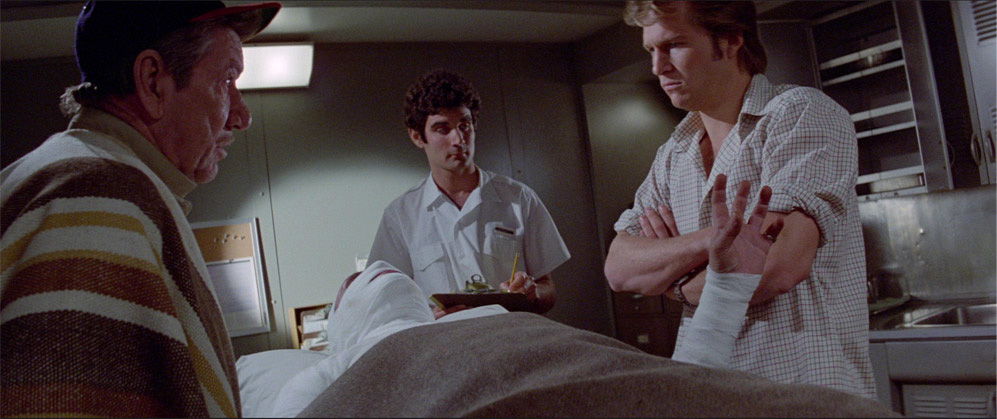
Attempting a synopsis of this particular film is like herding cats in fog blindfolded while bungee jumping but I'll give it a go… In the early 60s, a sniper murders the President of the United States and the sniper is subsequently gunned down a day later by a man with a precious stone surname (sound familiar?) Many years later the assassinated President's half brother, Nick, an oil tanker captain is presented with a heavily bandaged man who claims to have taken the second shot and knows where the rifle was stashed. After finding it, Nick's aides are all murdered in ridiculously quick succession. Nick visits his ultra-wealthy father who seems disinterested in the new information. After a night of frantic activity, Nick's father sends his son on a mission to interview all the known players in the conspiracy while Nick also tries to hook up with the love of his life. Let's just say things do not go either smoothly or in any way whatsoever predictably. This is a plus. Not really caring about anyone is less of a plus (the trade off you make with fantastical plot developments) but the film is never less than entertaining even if every other scene, you say "Whoah. Wait a minute… Huh?" There is something ever so 'off' about Winter Kills, whether it's the narrative that careers pinball-like across the US or some of the performances that seem as if they've been directed to be 'whacky'. I'm looking at you, Brad Dexter. Jeff Bridges stands as normal enveloped by a whirlwind of caricatures and overblown situations. Perhaps this was the result of the shoot starting with enthusiasm and gusto in 1976 and then being broken up by money troubles and union issues.
How Richert maintained his passion for the project as well as those willing to accept that they may never get paid for their work is oddly admirable. If you know the Kennedy story in any detail, you will find lots of obvious and deliberate parallels. If there was one aspect of the Kennedy story I hadn't any knowledge of, it was how his father, Joseph might have had a hand in putting his son on the US throne as it were. The relationship between father and son in the film is best illustrated by an extraordinary segue and one imagines an expensive one. Pa Kegan has just bullied his son to play detective. Bridges jams his dressing gown on, leaves frame right and then we cut to a series of seven shots of Nick galloping on a horse (can one gallop on anything else?) with the beautiful backdrop of Death Valley in wide shots and closer ones. Bridges really can ride and when he's far enough away from his father, he leaps off the horse and with as much frustration he can vent, screams out towards the obscenely large house, "You stink, Pa! You stink!" I have to admit only getting all this on a second viewing. At first I thought he was galloping off to another house where his father would be. This is a none too rare instance of the movie being smarter than the reviewer.
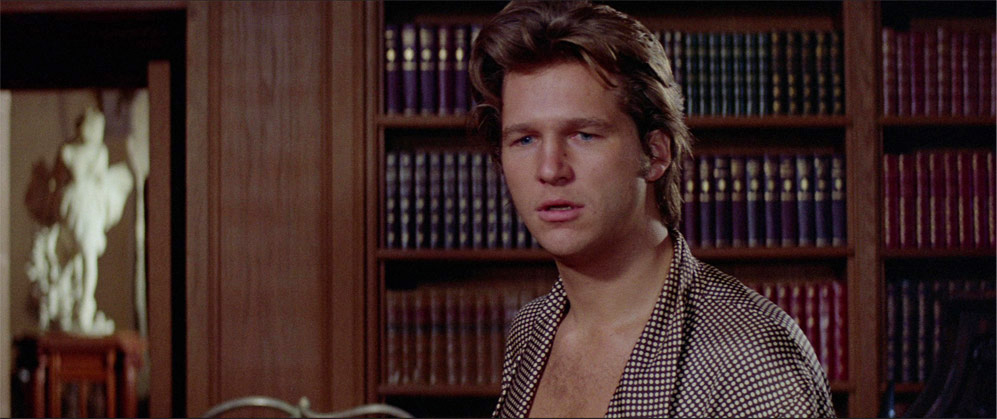
As mentioned the cast is just jaw-dropping. Nick Kegan is played by an impossibly young 'Dude', aka Jeff Bridges. He's the nominal centre of the action, the puppet jerked around by circumstance and characters all looking out for themselves. His father is played by the incomparable John Huston who when he's not directing classic Hollywood fare, he's playing some of the nastiest bad guys around. I love how he gives his all to the part, flouncing around with an open bath robe, not seeming to give two hoots how he appears at the age of seventy-three in scarlet budgie smugglers. He has that deliberate, portentous, drawling delivery that makes him absolutely unique as an actor and the scenes with him and his son (Bridges) crackle with energy. The outrageousness of Kegan Snr.'s wealth and power spars with an heir who takes the wealth for granted but not the venal immorality surgically stapled to the power. Indecent is up against decent in the ring and I'm afraid I can guess which usually ends up bloodied on the mat. Anthony Perkins, whose both arms were almost broken by Bridges using the wrong prop (ouch), plays Cerruti, a late seventies information master, a data wrangler with huge resources who maintains the obscenely rich's status quo. He knows everything but he's not telling. Spielberg's first choice for Quint in Jaws, Sterling Hayden, plays a deranged former political rival, Dawson. Bridges arrives to have a chat and ends up driving for his life while Hayden's four tanks give chase. It was this scene that made me breathe out slowly and go "OK…" and settle in to the madness on offer. Hayden's ridiculous chin beard simply adds more cream to the whole surreal chocolate éclair. King of Japanese cinema at the time, Toshirō Mifune, turns up in a blink and you'll miss him cameo. I know he was about in California in 1978/9 as he featured in Spielberg's 1941 speaking his native Japanese. Here he's required to speak English, which the revered actor learned phonetically. His larger role was cut due to illegibility issues. Director Richert's reasoning was that he didn't want to embarrass Mifune (so he got cut out). Hmm. Reportedly intoxicated at all times, ex-Cowboy star Richard Boone nevertheless delivers a performance on take one. There could be no take two. Finally, there's Eli Wallach who took on the Jack Ruby role in the mirrored Kennedy story. Adding to the rest of the talent in front of the camera, this was a dream cast, each famous name, once committed, prompting snorts of incredulous surprise from Richert's young leading man.
Behind the camera, it was the same story. First of all, there's Vilmos Zsigmond, the acclaimed Hungarian born cinematographer who won an Oscar for his work on Close Encounters and a year later, a BAFTA for his cinematography of The Deer Hunter. In 1976, he'd not yet achieved that level of acclaim but he'd already shot John Boorman's Deliverance, Robert Altman's The Long Goodbye and Spielberg's debut feature The Sugarland Express. Richert hired him on the cusp of global recognition and he doesn't disappoint. Then there's Maurice Jarre, probably one of the top three composers of that era. John Williams was establishing himself as top dog after Star Wars and while Jerry Goldsmith was hovering near the apex of his profession, Jarre had a number of very famous scores to his name, most of them hummable... No cynicism implied but it does help if an audience can remember your music. Most cineastes can make a good stab at humming both Lawrence of Arabia's main theme and Lara's theme from Doctor Zhivago. His score for Winter Kills is not as memorable and a little sparse. But then it's attached to a film that defies simple description so God knows what Jarre made of it. Then there's production designer Robert Boyle. Not a household name perhaps but here's a short excerpted list of his design credits… North by Northwest, The Birds, Marnie… No matter how old-fashioned Alfred Hitchcock may have become, how out-dated his technique, it's hard to deny that the great director, in so many cinematic aspects, got there first. Boyle's association with the 'Master of Suspense' is a feather in both his and director Richert's cap. Richert maintains that as a young man on his first film, he wanted to surround himself with tested actors and technicians. I doubt any first time director had as much luck but from the extras on this disc, it seems like the man deserved the luck.
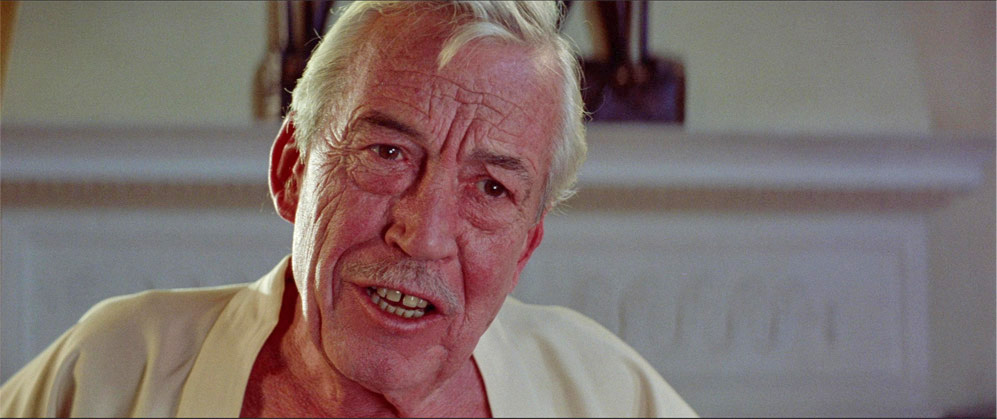
Winter Kills is at once, surprising, baffling, exhilarating, labyrinthine, simplistic and exciting. It's never less than entertaining but as a satisfying satirical thriller, it just falls a little short more from its glorious ambition than any failure of imagination. The characters are hard to care about (as most are caricatures) but this doesn't take too much away from one's enjoyment. It's well worth a look but try to watch it with a friend. The conversation it may stimulate will be just as entertaining.
This 2.35:1 aspect ratio, 1080p presentation looks like it just came straight from the lab. With the exception of the last few shots of the shorter 1983 re-issue (the only surviving version of this new ending was a 4:3 unsaturated source), lighting cameraman Vilmos Zsigmond's cinematography looks luscious and about as clean as it could be. The colours are vibrant, the contrast spot on and there is an almost supernatural absence of physical damage. Film grain is never an issue.
The original mono audio is fine and legibility is ninety-nine per cent. There is a smattering of lines I didn't catch first time around (Toshirō Mifune is not guilty in this respect) but this has more to do with performance and delivery than anything technical in the recording.
There are new and improved English subtitles for the deaf and hard-of-hearing.
Two presentations of the film: the 1979 Theatrical Cut (97 mins) and the 1983 Reissue Version (91 mins)
In the re-issue Richert replaces the opening cue (see Commentary Review) makes some trims, adds some more Elizabeth Taylor and inserts a new ending which is presented here as a 4:3 bleached out video blow up as no surviving film materials exist of this scene. It seems mean spirited to describe this alternate end scene but it's not one that changes the effect of the film in any significant way.
Audio commentary with writer-director William Richert (2003)
Pronounced 'Rich-Ut', the writer/director dives in with a Gatling gun torrent of information from his adoration of Maurice Jarre (and yet in the 'director's cut' the front title is replaced with a well known piece of pomp and circumstance music, Trumpet Voluntary by Jeremiah Clarke. You'll know it when you hear it). His commentary mirrors the insanity of his movie. He rented a house just so he could pretend to live near Jeff Bridges (unfurnished he had to sit in the sink) and the lady on the bike is his first wife and of course (he says as if it's the most natural thing in the word) she was intended to be in the first scene shot in space as she was an angel descending to Earth but "…it was never shot." Really? Richert mentions actress/photographer and ex-wife of Anthony Perkins, Berry Berenson. I was a little taken by that as I always thought Perkins was gay. That's the danger of 'stuff you know'. Assumptions are made of the past too. Berenson has a bit part in Winter Kills (as a morgue attendant) but is probably more morbidly famous as being a victim in one of the crashed planes on September 11th 2001. Richert's stories flow out at a heady pace. He remarks that the Richard Burton and Elizabeth Taylor divorce was notable for how much one wanted to leave to the other. Sweet. Huston apparently wore his same 'bikini' in a meeting with the director. I'm tempted to list the more entertaining stories but then what would be the point of listening to the commentary. I'll leave you with teasers… Cinema a la Rembrandt, casting a bookstore assistant, using the 'N' word as being right for a certain character and Richert's final remark that he's thankful to Anchor Bay (DVD distributors in 2003) who were "…smart enough to release it."
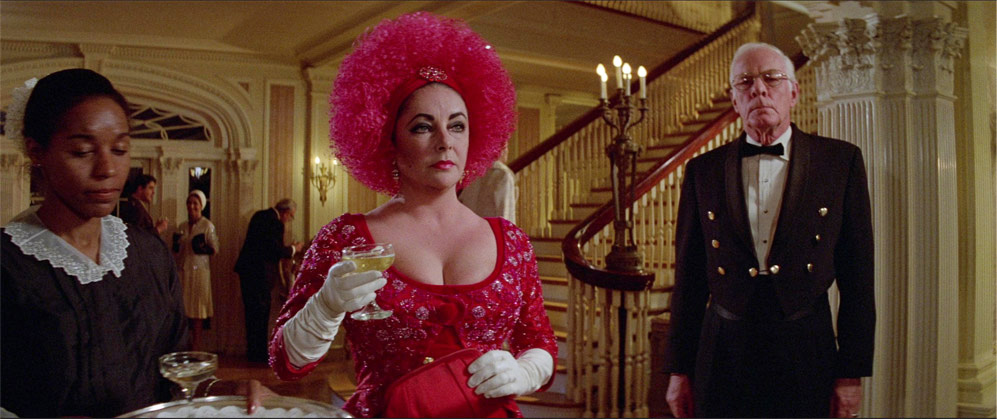
Who Killed 'Winter Kills'? (2003): retrospective documentary on the making of the film, featuring Richert, actors Jeff Bridges and Belinda Bauer, director of photography Vilmos Zsigmond, and production designer Robert Boyle (37' 51")
There is still genuine enthusiasm and love among those who participated in this most unusual film. The primary interview subjects all have the most charming stories and memories and Bill Richert comes across as a man for whom anyone would do anything. Even God gave him a break after he rallied against the heavens at bad weather given a second chance at finishing the film. Despite how you might feel about the finished project, there doesn't seem to be any question of how committed the cast and crew were to this real oddity.
Reunion (2003): Richert and Bridges reflect on the film's colourful production (9' 07")
This is a joy from start to a particularly lovely finish. There is nothing quite like relationships formed in the heat of shooting a film. Richert was in his early 30s on his directorial debut and almost every story about the making of the film reflects well on him. Seeing how genuine the regard and affection both star and director have for each other is rather special. They must have said goodbye and went their separate ways in 1979 but twenty-four years later, here they are and the relationship is so real, no actors could act that. All I was thinking was how much fun might it have been working on a Bill Richert set.
Star Stories (2003): Richert discusses the film's extraordinary all-star cast (7' 39")
Richert is a real storyteller. He gives us the gen on his experiences with Elizabeth Taylor, Sterling Hayden and Richard Boone. Each story is well worth your time but I think Richard Boone having a problem with the foghorn has to be my favourite. And, no. I'm not going to spoil it for you.
Things Happening in Secret (2020): critic and writer Glenn Kenny explores the history and legacy of conspiracy thrillers (30' 56")
Kenny's mid shot piece to camera presentation is informative, entertaining and somewhat surprising (if visually a little lacklustre). It strings together most of the principal conspiracy 'theories' that popped up in the wake of the assassination of President John F. Kennedy. Kenny leads us through the novels and films that explored the subject and as far as I can tell, he's pretty comprehensive.
Original theatrical trailer (3' 16")
Can't recall the last time I saw naked breasts in a trailer. Must have led a sheltered life. It's just that these days everything is so safe, so anodyne and so correct. This trailer with a gravelly voiceover (though not that gravelly voiceover) is a pretty good sell. It whips through the entire movie leaving nothing to the imagination (if you know the film). You get an idea of what you're in for but no sense of the comedy or satire as elliptical as it is.
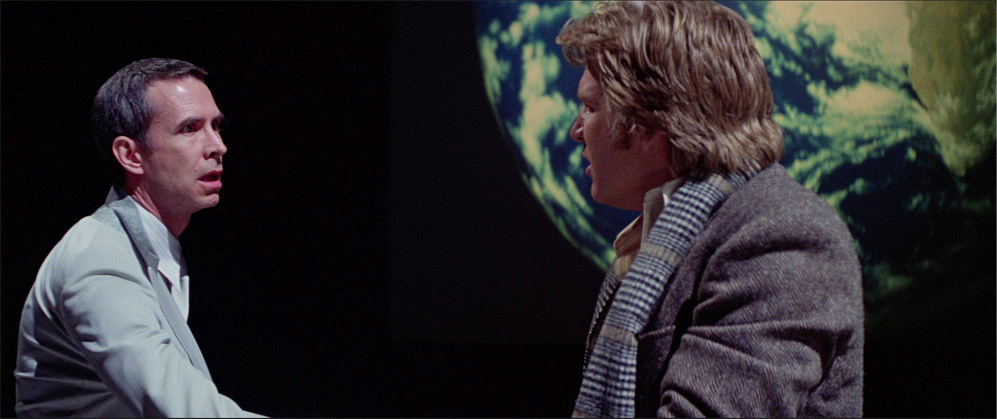
Josh Olson trailer commentary (2013): short critical appreciation (3' 29")
Olson adds some detail (a lot we have already gleaned after viewing the extras in order but that's hardly his fault) to the trailer of a film he holds in some high regard.
Radio spot (30")
With what sounds like generic music under a few dialogue snippets and a low voiced voiceover outlining the basis of the plot, this probably would have worked on me. The visual element (on radio?) is a pan up the promotional artwork.
Image gallery: publicity and promotional material
This extra includes 27 colour behind the scenes shots followed by 11 Front of House Black and White Stills with the first signed by John Huston and another showing the sexual clinch between two naked actors now oddly clothed. There are 10 press photos, a synopsis and 19 pages spread over 9 screens of production notes, details of the actors and crew, and notes on the script. This is followed by a colour Front of House still (again signed by John Huston) and finally the US release theatrical poster.
Limited edition exclusive 36-page booklet with a new essay by Anne Billson, archival accounts of the making of the film, Richert on Winter Kills, an overview of contemporary critical responses, and film credits
Anne Billson's piece on the film is an informative scene setter. She outlines the historical broad strokes and presents details of the cinematic environment that Winter Kills was about to be dropped into. The film had a lot of brothers and sisters in the conspiracy and paranoia genre at the time. She makes a terrific observation that well-known film actors could reassure an audience by popping up every now and again, that all is well even if you feel you may not be following the plot. We (the stars) will make you feel that it's all going to be OK. It's curious that it's almost the opposite effect in 1917 where each well known face almost removes your from the full experience of the film. The quote at the end of Billson's piece has an alarming connection to the quote Slarek prefaced his latest 2019 round up with (from Chernobyl). The Richard Boone delivered Winter Kill quote is:
"They will run you dizzy. They will pile falsehood on top of falsehood until you can't tell a lie from the truth – and you won't even want to."
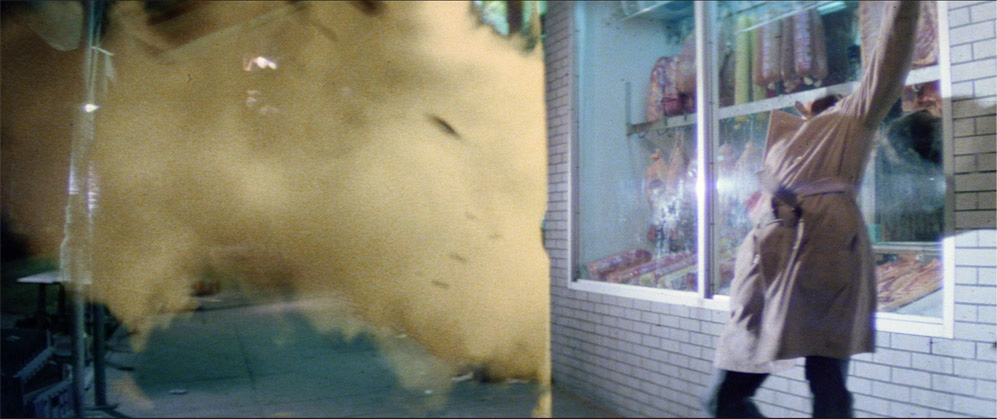
Next up is The Unmaking of Winter Kills, taken from four sources, it charts the extraordinary path of the film's budget. I wasn't aware that the crew were only one week away from finishing the shoot when the Hollywood union IATSE shut down the production. There were quite a few weeks worked without payment but both cast and crew seemed to be on a mission to finish the project. They were forced to suspend the shoot for what turned out to be years. Producer Fred Caruso deserves some major credit keeping all the bad news off his neophyte director's shoulders and incurring the wrath of the unions.'Wild Bill' Richert on Winter Kills by Richard T. Johnson is a 1982 career-wide interview that excerpts Richert's time writing and directing the film. It has plenty of details not featured in the extras so is well worth a read. Just a short observation; the interview is credited at the start to Richard T. Johnson but at the end to Richard T. Jameson. I'm assuming it's one or the other? Critical Responses come from Sight and Sound, the Monthly Film Bulletin and the Observer newspaper. The first two concentrate on the broader ambitions of the film comparing it to the source novel while Philip French's rave is surprising but welcome. It ends on the following quote which would have got me curious if not exactly lining up on opening day…
"The picture is both mad and weirdly plausible, and a manic energy conceals gaps and inconsistencies."
Winter Kills is an extraordinary oddity that may all be down to the source material by novelist Richard Condon. First time director William Richert sounds like one of the nicest guys in Hollywood, a man who was smart enough to surround himself with so much tested talent in front of and behind the camera, so that whatever he ended up with would have been interesting. As a thriller, it meanders a bit too wildly and as a satire, it's hardly biting but as entertainment, you won't find another movie anything like it.
|